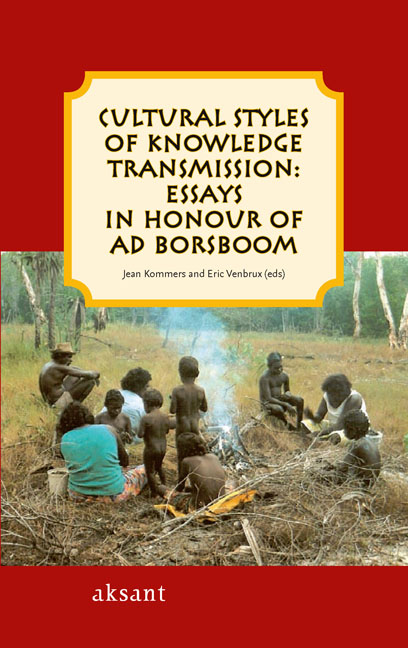Book contents
- Frontmatter
- Introduction
- Ad Borsboom
- Contents
- Maradjiri and Mamurrng: Ad Borsboom and Me
- Conversations with Mostapha: Learning about Islamic Law in a Bookshop in Rabat
- Education in Eighteenth Century Polynesia
- From Knowledge to Consciousness: Teachers, Teachings, and the Transmission of Healing
- When ‘Natives’ Use What Anthropologists Wrote: The Case of Dutch Rif Berbers
- The Experience of the Elders: Learning Ethnographic Fieldwork in the Netherlands
- On Hermeneutics, Ad’s Antennas and the Wholly Other
- Bontius in Batavia: Early Steps in Intercultural Communication
- Ceremonies of Learning and Status in Jordan
- Al Amien: A Modern Variant of an Age-Old Educational Institution
- Yolngu and Anthropological Learning Styles in Ritual Contexts
- Learning to Be White in Guadeloupe
- Learning from ‘the Other’, Writing about ‘the Other’
- Maori Styles of Teaching and Learning
- Tutorials as Integration into a Study Environment
- The Transmission of Kinship Knowledge
- Fieldwork in Manus, Papua New Guinea: On Change, Exchange and Anthropological Knowledge
- Bodily Learning: The Case of Pilgrimage by Foot to Santiago de Compostela
- Just Humming: The Consequence of the Decline of Learning Contexts among the Warlpiri
- A Note on Observation
- Fragments of Transmission of Kamoro Culture (South-West Coast, West Papua), Culled from Fieldnotes, 1952-1954
- Getting Answers May Take Some Time… The Kugaaruk (Pelly Bay) Workshop on the Transfer of Inuit Qaujimajatuqangit from Elders to Youths, June 20 - 27, 2004
- Conflict in the Classroom: Values and Educational Success
- The Teachings of Tokunupei
- Consulting the Old Lady
- A Chain of Transitional Rites: Teachings beyond Boundaries
- ‘That Tour Guide – Im Gotta Know Everything’: Tourism as a Stage for Teaching ‘Culture’ in Aboriginal Australia
- The Old Fashioned Funeral: Transmission of Cultural Knowledge
Ad Borsboom
Published online by Cambridge University Press: 21 January 2021
- Frontmatter
- Introduction
- Ad Borsboom
- Contents
- Maradjiri and Mamurrng: Ad Borsboom and Me
- Conversations with Mostapha: Learning about Islamic Law in a Bookshop in Rabat
- Education in Eighteenth Century Polynesia
- From Knowledge to Consciousness: Teachers, Teachings, and the Transmission of Healing
- When ‘Natives’ Use What Anthropologists Wrote: The Case of Dutch Rif Berbers
- The Experience of the Elders: Learning Ethnographic Fieldwork in the Netherlands
- On Hermeneutics, Ad’s Antennas and the Wholly Other
- Bontius in Batavia: Early Steps in Intercultural Communication
- Ceremonies of Learning and Status in Jordan
- Al Amien: A Modern Variant of an Age-Old Educational Institution
- Yolngu and Anthropological Learning Styles in Ritual Contexts
- Learning to Be White in Guadeloupe
- Learning from ‘the Other’, Writing about ‘the Other’
- Maori Styles of Teaching and Learning
- Tutorials as Integration into a Study Environment
- The Transmission of Kinship Knowledge
- Fieldwork in Manus, Papua New Guinea: On Change, Exchange and Anthropological Knowledge
- Bodily Learning: The Case of Pilgrimage by Foot to Santiago de Compostela
- Just Humming: The Consequence of the Decline of Learning Contexts among the Warlpiri
- A Note on Observation
- Fragments of Transmission of Kamoro Culture (South-West Coast, West Papua), Culled from Fieldnotes, 1952-1954
- Getting Answers May Take Some Time… The Kugaaruk (Pelly Bay) Workshop on the Transfer of Inuit Qaujimajatuqangit from Elders to Youths, June 20 - 27, 2004
- Conflict in the Classroom: Values and Educational Success
- The Teachings of Tokunupei
- Consulting the Old Lady
- A Chain of Transitional Rites: Teachings beyond Boundaries
- ‘That Tour Guide – Im Gotta Know Everything’: Tourism as a Stage for Teaching ‘Culture’ in Aboriginal Australia
- The Old Fashioned Funeral: Transmission of Cultural Knowledge
Summary
Anthropologists are observers of others and of themselves. The latter is a necessary condition for a healthy dose of self mockery and for a sense of perspective. These two properties are amply available in the person of Ad Borsboom. It would be tempting to present a specimen of his idiosyncratic sense of humour, but I am afraid that his jocular style is too refined to be committed to paper properly. Empathy, a further indispensable quality for a good anthropologist, is another of Ad's prominent attributes. It is only fair to say that this admirable trait must have cost Ad tremendous amounts of time, as, precisely because of his empathic powers, he was an intermediary par excellence. Difficult jobs almost naturally landed on his desk. I will not mention all the affairs he was requested to solve; it suffices to confess that we were clever enough to use (some might say ‘abuse’) his ‘I cannot be blamed for this’-face on a number of occasions. The working title of this Liber Amicorum has been ‘Teaching and Learning in Unknown Cultures’. A period of administrative duties as a vice-dean must at least have embodied a bit of ‘learning in strange cultures’ for Ad, just as my deanship contained a strong component of learning in strange cultures for me.
In my first round of ‘functioning discourses’ with the faculty's full professors, I tried to unite the members of the societal sciences (Sociology, Anthropology and Developmental Studies, Communication Science) under what I thought was their common denominator: Sociology. Although Ad has always championed his field of cultural anthropology very ardently, I received a fair share of support from him for my endeavour. Unfortunately, my attempts were not very fruitful. It was clear from discussions I had with Ad and with one of his PhD students (who later became an important person at the Faculty Bureau) that, although they could agree with my statement with respect to general theories, they added some important insights: sociologists observe global entities or systems, whereas anthropologists not only observe groups but also the behaviour of individuals, and as such would probably have more in common with psychologists.
- Type
- Chapter
- Information
- Cultural Styles of Knowledge TransmissionEssays in Honour of Ad Borsboom, pp. 5 - 8Publisher: Amsterdam University PressPrint publication year: 2009

